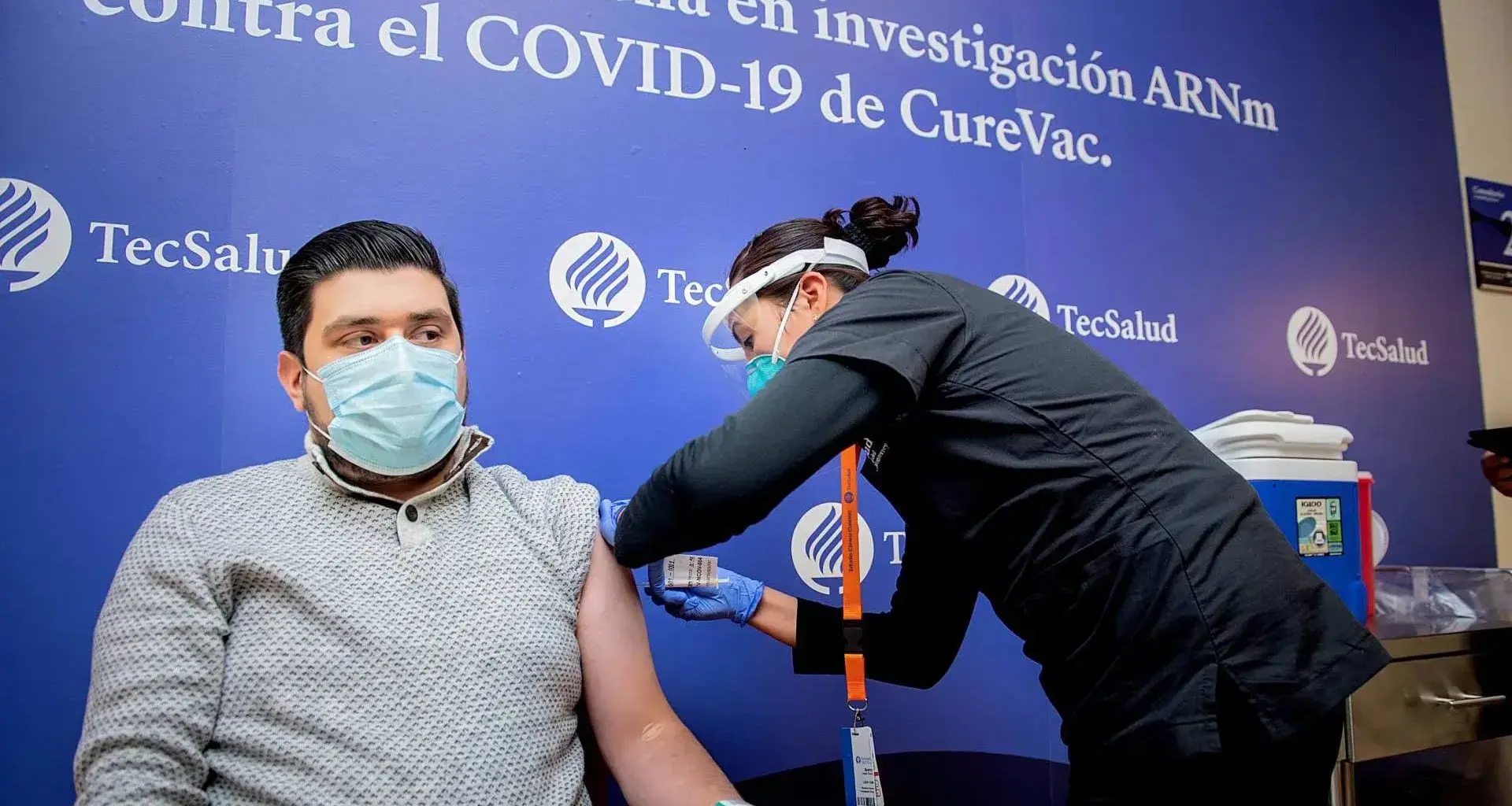TecSalud, the health system of Tecnológico de Monterrey, has begun administering the vaccine candidate to volunteers participating in Phase 3 clinical trials of the mRNA COVID-19 vaccine manufactured by the CureVac laboratory.
At 7.00 a.m. on February 15, the first volunteers arrived at the Clinical Research Area for Vaccines at TecSalud’s Zambrano Hellion Hospital, which will be the center for administering vaccines and placebos to 3,000 volunteers.
“By participating in the testing of the German mRNA COVID-19 vaccine, a protocol authorized by COFEPRIS, Mexico is leading Latin America”, explained Dr. Guillermo Torre Amione, Rector of TecSalud and Vice President for Research at Tec de Monterrey.
“TecSalud is proud to be actively participating in these kinds of research protocols for the diagnosis and treatment of COVID-19, with the hope of fighting the disease,” he added.
Similarly, Dr. Torre stressed that this initiative was the result of authorities, academics and civil society engaging in public-private collaboration, synergy, and multidisciplinary efforts to stop the advance of the pandemic.
"TecSalud is proud to be actively participating in these kinds of research protocols for the diagnosis and treatment of COVID-19, with the hope of fighting the disease".
Safety and efficacy of the German CureVac vaccine
Dr. Servando Cardona, National Director of Clinical Research at TecSalud, explained that this phase of clinical trials could be very promising.
“An efficacy rate of above 90% has been confirmed in the trial results available at the moment, with a higher range of safety than that of other vaccines.
“This is thanks to messenger RNA technology, which allows us to imprint the virus’s RNA in order to sequence its amino-acid chain and cause an immune response,” he added.
The expert said that this vaccine requires deep-freezing at -80 degrees but has been proven to be stable at higher temperatures, and can be kept for up to three weeks.
Dr. Cardona said that, without a doubt, this is going to be a very important medical advance: never before in the history of mankind have drugs been tested at such scale and in such a short time.
“Recruiting 36,500 volunteers in two months around the world is the result of extraordinary logistics. It means that the vaccine can get everywhere and be applied following the same processes and to the same standards,” he said.
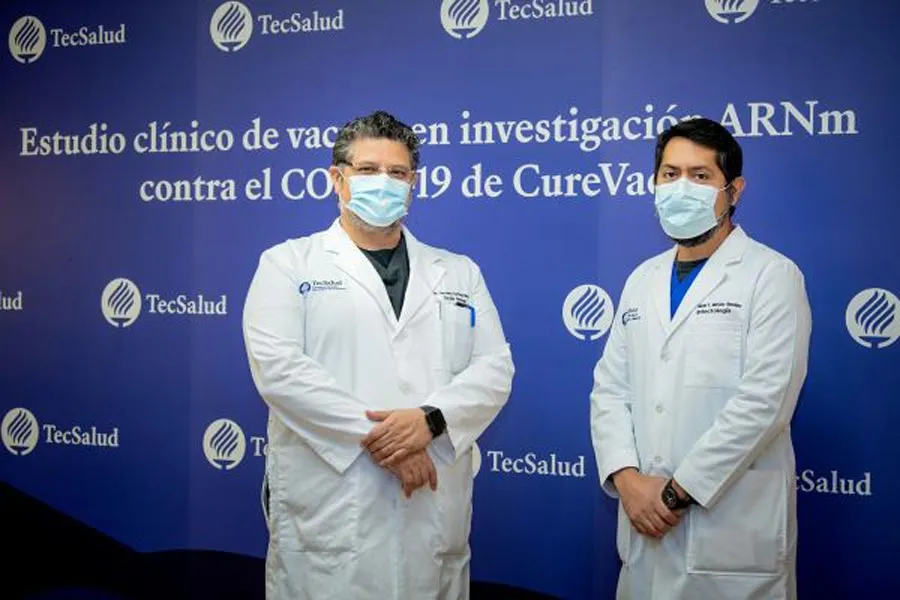
Dr. Michel Martínez, leader of TecSalud’s COVID-19 Program and lead researcher for the clinical trial, explained that the vaccine is intended to be effective in preventing cases of COVID-19, as well as measuring other parameters.
“These are other so-called secondary efficacy parameters, which are: safety and, if the disease occurs, avoiding hospitalization or even death,” he shared.
Messenger RNA vaccines, unlike traditional vaccines, do not require the injection of an attenuated or inactive virus, but rather convey information about proteins to teach our cells to produce the “spike protein” which lives on the surface of the virus.
“Since the body has already produced the protein, it has developed antibodies against it. When the virus arrives with this protein, it is rejected and cannot anchor itself,” said Dr. Martinez.
“An efficacy rate of above 90% has been confirmed in the trial results available at the moment, with a higher range of safety than that of other vaccines.”
An opportunity to change history
Ramiro Alejandro Aguirre García, 28, became the first volunteer to receive the CVnCoV Phase 3 test vaccine from the CureVac laboratory.
“I was nervous but excited at the same time because it’s a great opportunity to receive a COVID-19 vaccine and to be able to help the entire population by participating in finding a solution to the pandemic,” he said.
He reported having felt no discomfort or side effect during the 30-minute observation and recovery period.
Participating in the clinical trial meant Ramiro had the possibility of getting the vaccine in advance. Normally, due to his young age, he would have to follow the federal Ministry of Health’s vaccination plan and wait to be vaccinated in coming months.
He encouraged the general public to participate in clinical research studies.
“I think there has been a lot of misinformation among the public about the vaccines not being good, having been created too quickly, and that there are many people who don’t want to be vaccinated.
“It’s important to change people’s mentality, and to share the message that vaccines help and provide hope for the entire population.
“Vaccines help and provide hope for the entire population.”
Volunteer safety
Participants in the CureVac mRNA vaccine Phase 3 clinical trial followed a detailed step-by-step process to register in order to ensure the safety of all participants.
First, they sent their contact information through the official TecSalud site; afterwards, they filled out a registration form which was evaluated. All volunteers were notified by email about whether they were eligible to participate in the study and if they met the criteria specified by CureVac.
Volunteers confirmed as eligible scheduled their first visit to the Clinical Research Area for Vaccines at TecSalud’s Zambrano Hellion Hospital online, to undergo a medical evaluation and sign consent forms.
If the evaluation did not yield any additional data excluding them, participants could be given the first dose of the research product, which could be a vaccine or a placebo.
Two doses will be given, the second approximately one month after the first. The volunteers will make a total of 5 visits during a period of 393 days, as well as keeping an electronic diary and receiving advice and follow-up via phone calls.
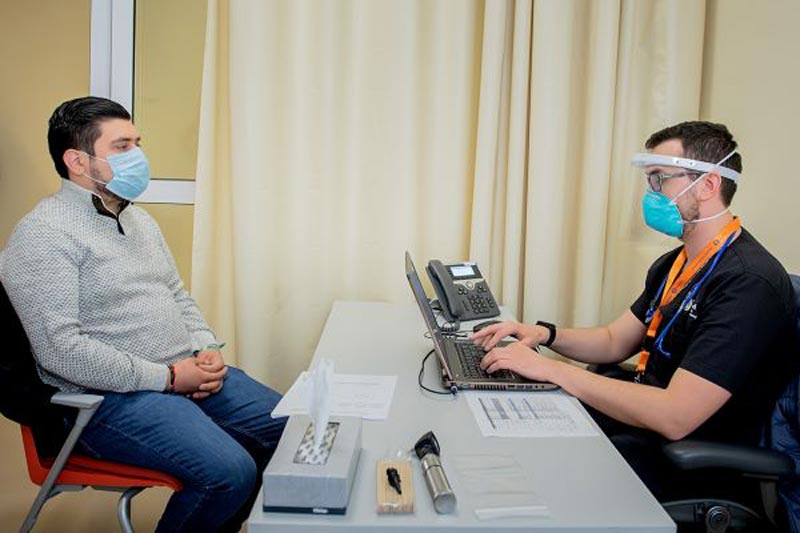
The scope of the Phase 3 CureVac Vaccine Clinical Trial
Of the 8,000 doses that will be given in Mexico, 3,000 will be administered in Monterrey by TecSalud, which will lead the study in the city.
The rest will be given by other research centers throughout Mexico. This will meet the requirements for the number of volunteers in Mexico which form part of the 36,500 volunteers around the world.
It is a randomized double-blind clinical trial, which means that an assigned experimental group of participants receive the vaccine and a control group receive a placebo.
The double-blind method is used as part of the scientific process so that neither the participants nor the researchers know who belongs to the control group and who belongs to the experimental group. This eliminates bias on both the part of the participants and the researchers.
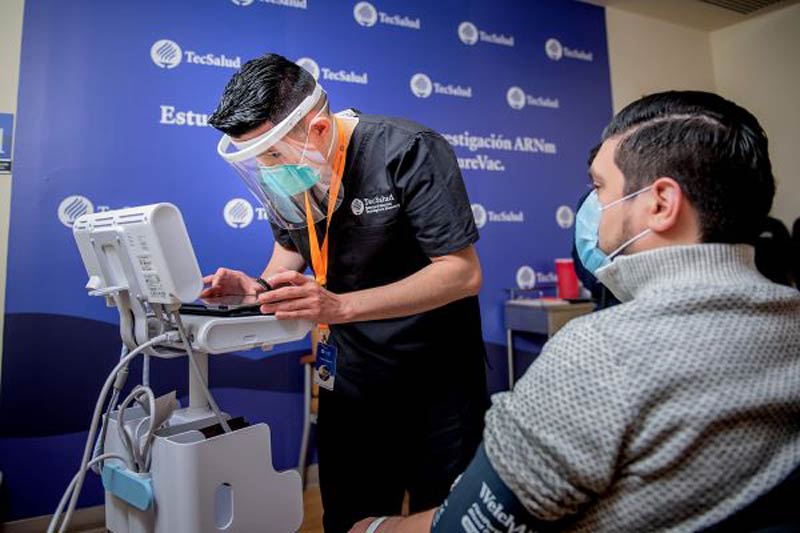
To determine efficacy, the number of SARS-CoV-2 infections in the group that received the vaccine will be compared with the group that received the placebo.
“If we demonstrate efficacy, the clinical trial could be ended early, between the eighth and ninth months. We would then give the placebo patients the vaccine, so they could possibly receive it before the end of the 13 months,” explained the study’s lead researcher, Michel Martínez.
Dr. Torre said that understanding whether the Mexican public will respond without major complications, without major side effects, and with the same effectiveness as other populations, is very important to the Mexican community.
“We have studied few Phase 3 vaccines in Mexico. CureVac is one of them, and it is the only one that uses RNA technology tested through clinical studies undertaken in Mexico.
Having a vaccine in an experimental phase in Mexico will provide additional data to the results of international studies. It will give us clear information about how it will benefit the Mexican public,” concluded Dr. Torre.
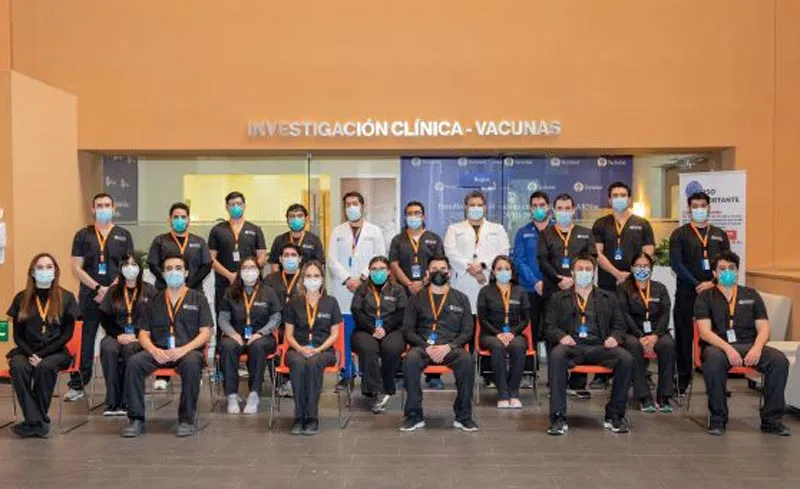
YOU’LL DEFINITELY WANT TO READ THIS TOO:

